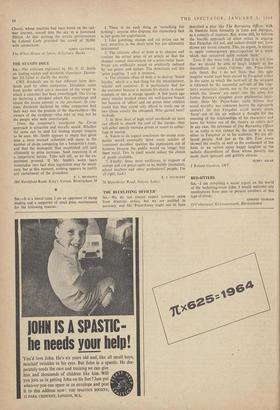SIR,—We do not always expect common sense from dramatic critics,
but we are entitled to accuracy, and Mr. Pryce-Jones, ought not to have described a play like The Recruiting Officer, with its freedom from formality in form and dialogue, as a comedy of manners. But, worse still, he follows the bucolic approach of other critics in arguing that Farquhar did not, and indeed should not, have shown any moral concern. This, he argues, 'is merely to apply contemporary preoccupations to a work which was conceived quite outside them.'
Even if this were true, I hold that it is not true that we should be able to laugh happily at the discomfiture of yokels ('clowns,' Mr. Pryce-Jones calls them). But I do not think that this ugly laughter would have been shared by Farquhar either in the scene in which the hard-sell of the sergeant is followed by the successful soft-sell of the Cap- tain's aristocratic charm, nor in the court scene in which the 'clowns' are swept into the army but Justice Balance's daughter given preferential treat- ment. Does Mr. Pryce-Jones really believe that social morality was ,unknown before the eighteenth century? Or that Farquhar could merely pluck 'farce' out of the air without a thought, for the meaning of the relationships of his characters and leave his brains out of the theatre as critics do? In any case, the relevance of The Recruiting Officer to us today is not, cannot be, the same as it was either to Farquhar or to his audience. We are dif- ferent people. And just as the film Tom Jones showed the cruelty as well as the excitement of the hunt, so we cannot enjoy happy laughter at the sadistic discomfiture of those whose poverty has made them ignorant and gullible clowns.
HENRY ADLER






























 Previous page
Previous page